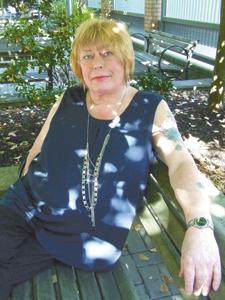A transsexual woman evicted from her unit in a low-income Vancouver housing complex has filed a complaint with the BC Human Rights Tribunal against her former landlords, alleging she was discriminated against because she is transgendered.
Pam Burge, 65, named The 127 Society for Housing and the Anglican Church as respondents in her complaint.
She alleges she endured constant harassment from building administrator Joanne Graham before being evicted from the Wellspring building at 415 Nelson St in June. The building, which houses low-income and hard-to-house tenants, is one of three housing complexes managed by the non-profit society and linked to the New Westminster Diocese of the Anglican Church of Canada.
In her complaint, Burge alleges she was subjected to homophobic slurs and numerous suite inspections, told to scrub her balcony by hand and required to pay for accidentally damaging a sprinkler in her unit.
Burge feels the demands were unreasonable because she is a senior with physical and mental disabilities. She further alleges the harassment “was all because I am transgender.”
Burge’s former landlord denies any discrimination. Graham says the reasons for Burge’s eviction are listed in a letter from a dispute resolution officer. She referred Xtra to her lawyer for further comment.
Lawyer Harley Harris says he hasn’t received any notification of complaint from the Human Rights Tribunal. If a complaint has been filed, he will “vigorously” defend his clients against the allegations, he says.
In April, Burge was served a 30-day notice of eviction for allegedly breaching her tenancy agreement and the Residential Tenancy Act.
In legal documents obtained by Xtra, The 127 Society for Housing claims Burge owes more than $800 in damages to her suite, plus miscellaneous costs. The Society also claims Burge owes $1,355 in accrued rent for refusal to provide them with financial documents proving her low-income status.
Burge says she provided The Society with all the financial documents she had, but “there was still this constant demand. I don’t know what more she wanted from me.”
“They claim that she owed money [but] I’ve obtained her financial file from BC Housing and there’s no money owing, there are no red flags,” says Burge’s mental health advocate, Maryann Boyle.
Burge appealed the eviction to the Residential Tenancy Branch (RTB), and a hearing began but was adjourned. Before the hearing reconvened, Burge says she received an RTB notice informing her the eviction would be upheld and an order of possession granted for non-payment of rent and breaching the terms in the RTA and the Tenancy Agreement.
Burge believes her treatment at the RTB was not only unbalanced but discriminatory.
“No matter what I said in trying to get my story out, as soon as I would speak about issues of harassment I was cut off,” she says.
“Within about three minutes of the hearing, he [the dispute resolution officer] started referring to me as a man,” she says.
Alan Hans attended the hearing to support Burge and confirms she was referred to as “he,” “him” and “Mr Burge” by the adjudicator, despite numerous attempts to correct him.
A spokesperson for the Ministry of Housing and Social Development says the RTB has since apologized for the “incorrect title used.”
For now, Burge has found temporary housing but says she’s been taken off the province’s subsidized housing list and told to reapply with references from her last landlord for future assistance.
“I’m between a rock and nowhere,” she says.
“BC Housing is willing to accept a new application from Ms Burge,” the spokesperson says, “and staff have explained to Ms Burge what is required to submit a new application, and will assist her with further clarification if needed.”

 Why you can trust Xtra
Why you can trust Xtra


